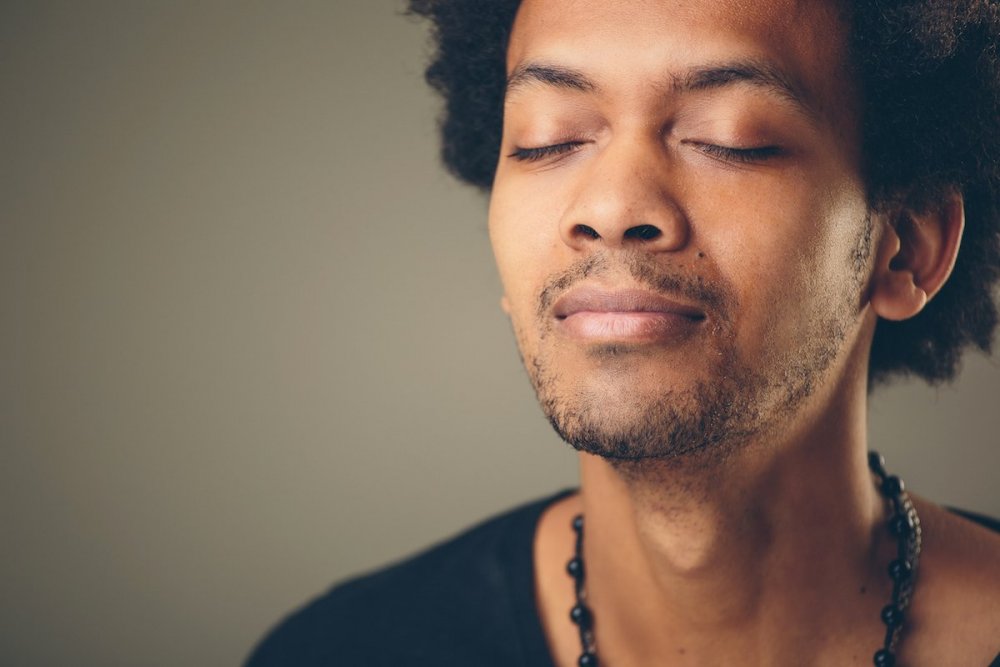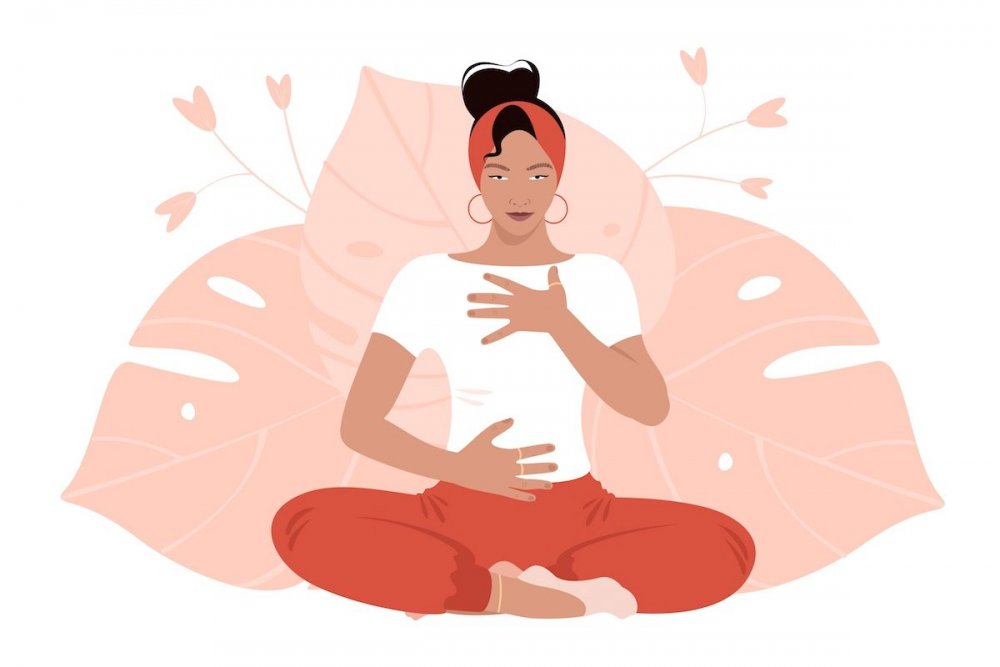Is it possible to relieve stress, improve heart health and reap other benefits simply by regulating our breath? Sonia Vadlamani explains how conscious breathing can contribute towards better mental and physical health. Plus, learn how to practise it from home.
Breath is vital for life. We’re always breathing, yet it’s something that most of us are barely aware of. However, our natural breathing rhythms can have a substantial impact on how both our body and mind function.
Research shows that our breathing patterns change according to the emotions or thoughts we’re experiencing. For example, we tend to draw slow, deeper breaths when we’re happy, resulting in the release of happiness hormones. In contrast, we take sharp, shallow breaths when we’re angry or stressed, activating the stress receptors in the amygdala region in the brain.
Indeed, in the current climate of a global pandemic, living with stress and anxiety has become increasingly commonplace, and hence keeping a periodic check on stress levels and devising effective stress management methods is more crucial than ever.

Conscious breathing can help to reduce stress shutterstock/UfaBizPhoto
What is conscious breathing?
As the name suggests, conscious breathing involves bringing awareness towards your breath and then altering it deliberately to achieve a desired outcome. Also known as controlled breathing, conscious breathing can help us recognize our response towards stressors and emotions, enabling us to manage our stress in a better manner, thus preventing conditions like burnout, anxiety and depression.
There is ample research that establishes a strong connection between our breathing patterns, pace of breathing and our corresponding thoughts, emotions and behavior. This makes conscious breathing massively effective – modifying the pace of our breathing can slow down our heart rate, modulate stress triggers and enable us to think more rationally.
“Conscious breathing can help us recognize our response towards stressors and emotions, enabling us to manage our stress in a better manner.”
While conscious breathing may sound like a modern-era invention, recommendations for breath modulation techniques for better health date back to first millennium B.C. Ancient religions like Hinduism and Taoism have advocated breath as an ‘essential life-force’ in the form of prana and qi respectively. Interestingly, yogic practices like pranayama or ‘breath-retention’ utilize controlled breathing techniques for enhancing concentration and vitality.
RELATED: Tummo Breathing and Meditation: a Guide
Breathing is “meditation for people who can’t meditate”, states Dr Belisa Vranich, the author of the best-selling book Breathe. Indeed, most relaxation therapies and stress-relief techniques utilize breathwork as their anchor, as breathing is the common factor involved in these methods for calming the body and the mind.
A simple way to practise conscious breathing
Conscious breathing is simple to practise and doesn’t require any specialized equipment. What's more, it can be practised by children and adults alike, from the comfort of their home. However, it’s essential to set aside some time to truly be able to reap the benefits.
Here’s a simple mindful breathing practice you can follow with ease:
-
Start by getting into the right posture – seated or lying down – keeping your spine in a neutral position.
-
Place one or both hands on your belly. Inhale slowly and feel the sense of expansion as your breath reaches where your hand is.
-
Hold your breath to a count of 3. You can adjust this duration as per your comfort.
-
Exhale slowly as you feel the belly muscles underneath your hands relaxing.
- Observe your breath pattern for at least 4 - 10 minutes.
During this practice, be sure to engage in diaphragmatic breathing. This involves inhaling deeply as you expand the belly, and then exhaling slowly as you contract the diaphragm and allow the belly to deflate. You can combine conscious breathing with a form of meditation or even restorative yoga to increase its effectiveness. Merging conscious breathing with mindfulness meditation can boost memory power as well.
The benefits of conscious breathing
Here are some ways in which conscious breathing can improve your quality of life and help you sustain better well-being:
1. Relaxes the nervous system
When confronted with danger, our nervous system or sympathetic drive generates a ‘fight-or-flight’ response which can potentially help us rise to face a challenge. However, sometimes the smallest and everyday woes like a traffic jam and impending deadlines begin invoking this involuntary stress response on a continued basis. This can result in immune system suppression or even conditions like depression and anxiety, owing to the excessive stress build-up.
RELATED: Outdoor Meditation: How to Meditate in Nature
Resetting our breathing pattern can calm down the nervous system, preventing a perennial sympathetic overdrive condition. Conscious breathing allows activation of the parasympathetic nervous system, or the ‘rest-and-digest’ signal, which enables us to function in a relaxed state.
2. Creates energy boost
Conscious breathing involves taking deep, slow breaths as you engage your abdominal muscles and diaphragm, instead of stressing the shoulder and neck areas as most of us are usually habituated to. Engaging respiratory muscles in this manner enables better oxygen supply for the tissues and cells in the body. This increased oxygen reach can make us feel more energized, focused, and can even boost productivity.
3. Helps you focus
Sometimes it’s difficult to concentrate on the task at hand or meditate properly because of our inability to focus. Indeed, billboards, constantly buzzing phones and other technological inventions contend for our attention all the time, making it more difficult to be able to concentrate on a single thought or task.
 Breathing consciously boosts focus and attention
Breathing consciously boosts focus and attention
Conscious breathing requires us to focus on our breathing pattern, which can help us calm our senses and organize our thought patterns in a productive manner. A 2017 breathing intervention study from Beijing Normal University that involved 40 individuals found that diaphragmatic breathing could enhance sustained attention, in addition to a dip in cortisol (the body's main stress hormone).
4. Relieves muscle tension
We tend to hold our breath or draw irregular breaths when we’re tensed or are faced with stress stimuli, which allows our sympathetic nervous drive to kick in. While this response to stress can be helpful in the short-term, drawing shallower and faster breaths can easily become a habitual trait, which may involuntarily result in constant muscle tension, especially in the neck and upper back areas.
A 2018 study from Thailand's Khon Kaen University involving female subjects with neck tension and pain complaints found that deep and slow breathing practices reduce muscle tension, pain alleviation, and improved heartrate variability, even in the short run.
Progressive muscle relaxation is another therapeutic method prescribed for relieving muscle tension and averting anxiety, with the help of conscious breathing techniques.
5. Enhances emotional wellbeing
“Feelings come and go like clouds in a windy sky. Conscious breathing is my anchor,” advocated Thích Nhat Hanh, the world-renowned spiritual teacher and mindfulness expert. By calming down our nervous system, conscious breathing offers clarity in thought and enables us to be mindful of our feelings.
“There is ample research that establishes a strong connection between our breathing patterns, pace of breathing and our corresponding thoughts, emotions, and behavior.”
The idea here is not to eradicate the unpleasant emotional states entirely, but to gradually learn to be aware of them and experience them with self-compassion. This process allows us to respond to our emotions in a productive and helpful manner, thus potentially preventing the tendency to ruminate and improving our emotional wellbeing.
6. Regulates blood pressure
Taking a deep breath could help reduce stress and prevent your blood pressure from spiking. Indeed, research suggests that controlled breathing can improve one’s ‘baroreflex sensitivity’, thus regulating blood pressure and preventing hypertension. Conscious breathing can be utilized as a therapeutic approach for boosting heart health and improving vigor.
7. Enables better decision-making
Research shows that taking deep and controlled breaths can accelerate vagal nerve activity, thereby improving heart rate variability and lowering stress levels, in addition to aiding better decision-making ability. Indeed, Navy SEALs and chess champions have relied on conscious breathing techniques like ‘box breathing’ to be able to make sound decisions when under stress.
RELATED: Uncovering the Healing Power of the Breath
In a collaborative study from 2019, researchers from Belgium, France and the Seychelles asked management students to follow the ‘5-2-7 pattern breathing technique’. This method entails inhalation for the count of 5, holding the breath for 2 counts and exhalation for 7 counts. The students carried out the breathing exercise before answering a series of questions in a decision-making test.
In addition to facilitating better decision-making, the researchers found that conscious breathing also prevented post-performance stress among the students.
8. Lowers stress and anxiety
Research points out that our degree of ‘alertness’, or how ‘awake’ we are, determines the course of action we choose when we are under psychological pressure or in a potentially stressful situation. While being ‘optimally alert’ can improve our mental performance, thus boosting our decision-making ability, alertness beyond the critical point can trigger stress, ultimately hampering performance under duress.
Interestingly, conscious breathing tends to modify one’s arousal levels to the ‘optimal or conditioned level’ required for enhanced mental performance, while controlling any further rise in arousal levels, thus keeping stress and anxiety at bay.
Round up: conscious breathing
In conclusion, the advice to slow down your breath and pay attention to the same is not just a generic suggestion or mere commonsense, but a statement that holds merit. Taking deep, diaphragmatic breaths and focusing on the pace of our breath can impact our body and mind in a positive manner.
Acknowledging the power of conscious breathing can be empowering, as it can enable us to draw from our innate wisdom and make headway towards a positive transformation. •
Main image: shutterstock/AKSAMIT
happiness.com | The fine art of being: learn, practise, share
Are you a happiness.com member yet? Sign up for free now to:
■ enjoy our happiness magazine with practical life tips
Stress management | Motivation | Burnout
Written by Sonia Vadlamani
 Fitness and healthy food blogger, food photographer and stylist, travel-addict and future self journaler. Sonia loves to write and has resolved to dedicate her life to revealing how easy and important it is to be happier, stronger and fitter each day. Follow her daily pursuits at FitFoodieDiary or on Instagram.
Fitness and healthy food blogger, food photographer and stylist, travel-addict and future self journaler. Sonia loves to write and has resolved to dedicate her life to revealing how easy and important it is to be happier, stronger and fitter each day. Follow her daily pursuits at FitFoodieDiary or on Instagram.


Join the conversation
You are posting as a guest. If you have an account, sign in now to post with your account.
There are no comments to display.